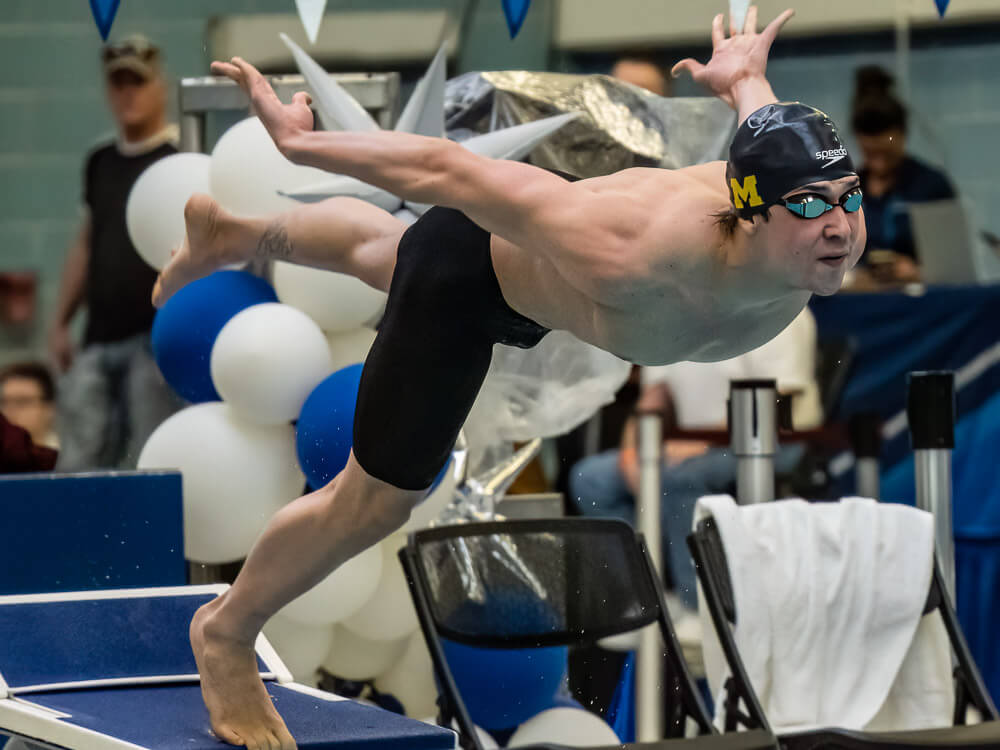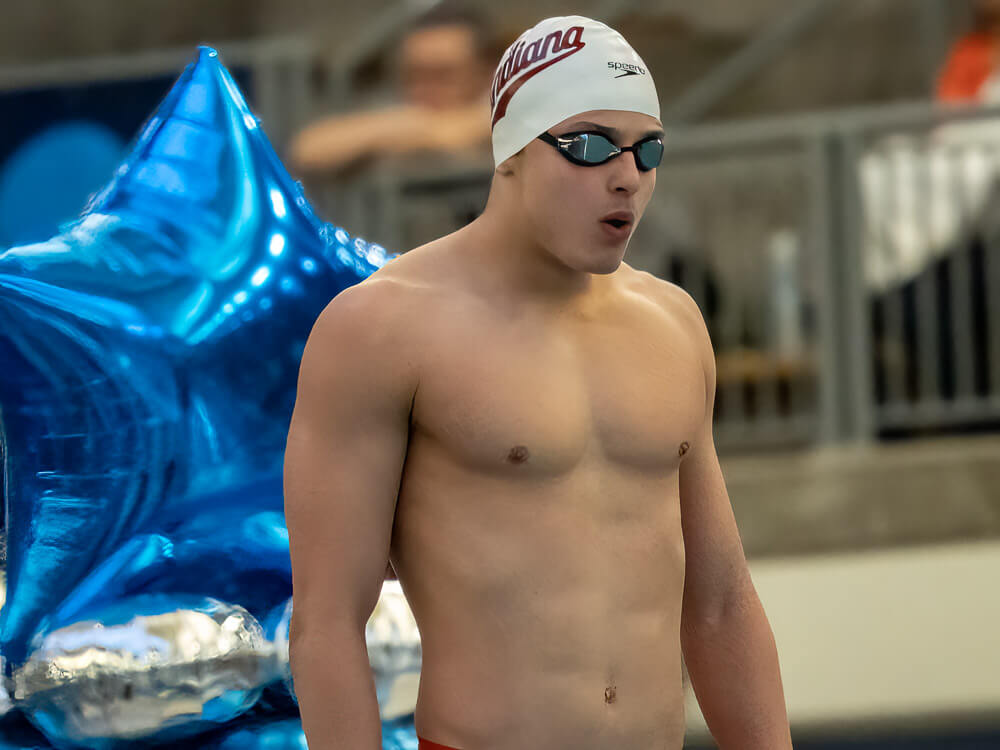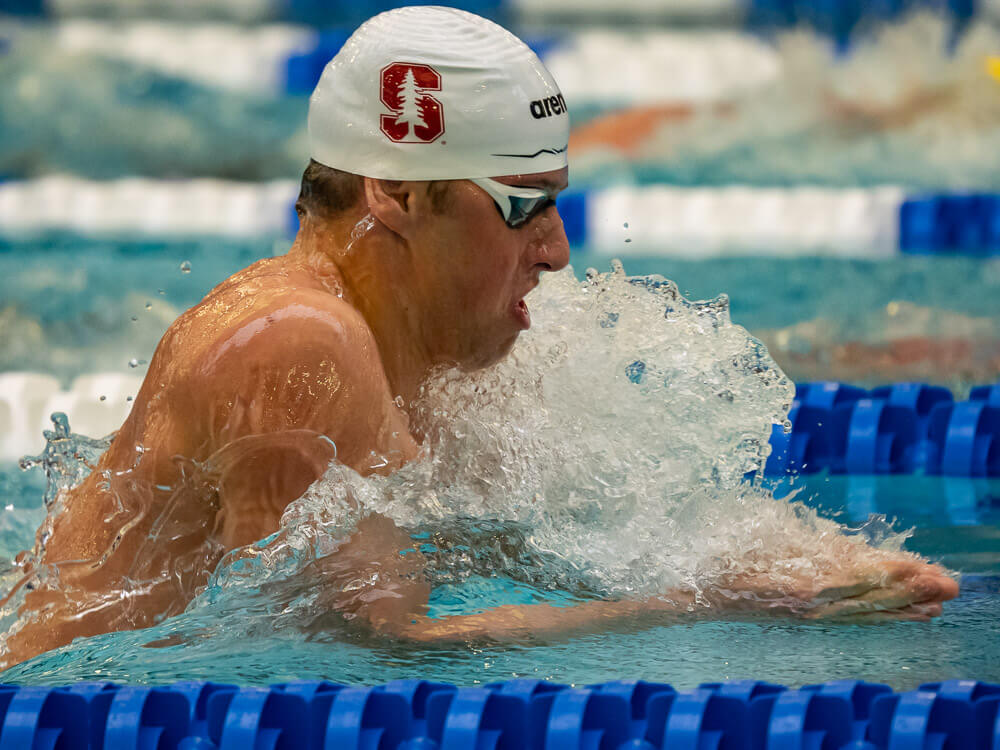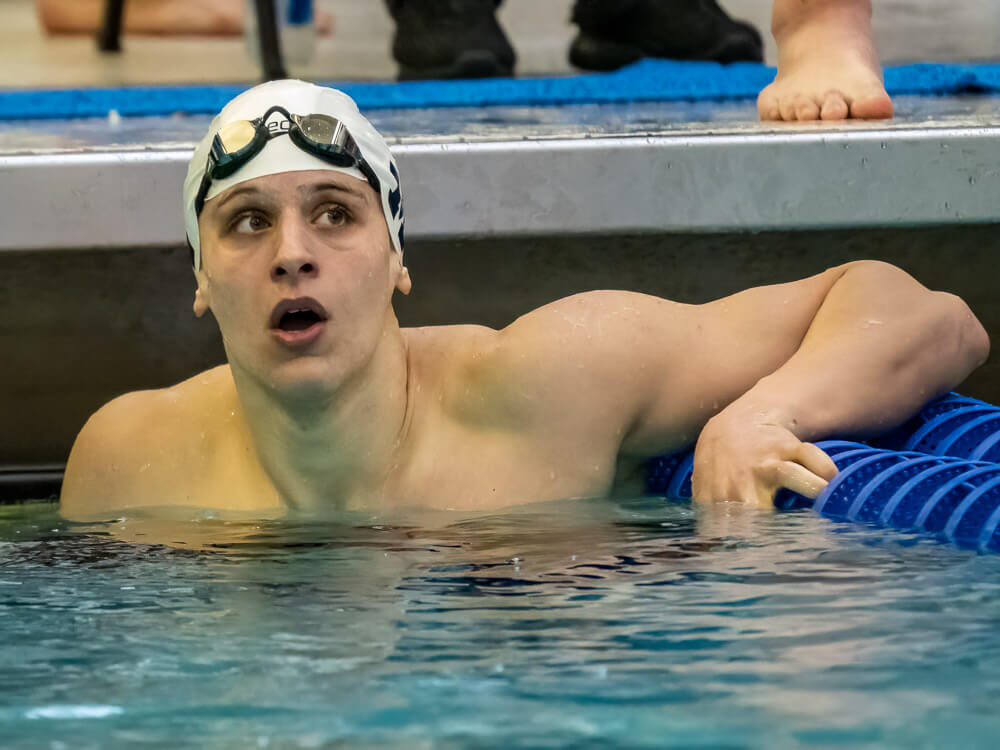‘A Feeling of Home’: Burgeoning Israel Program Has Impressive Men’s NCAAs

‘A Feeling of Home’: Burgeoning Israel Program Has Impressive Men’s NCAAs
Gal Groumi popped out of the pool at the University of Minnesota after Saturday’s swim-off in the 200 butterfly and was greeted by two on-deck cheering sections.
One was to be expected – his maize-and-blue-clad Michigan teammates, lining the pool deck at the end of the session, thrilled that Groumi bested Tennessee’s Martin Espernberger to earn a lane in the A final at the NCAA Men’s Championships.

Tomer Frankel; Photo Courtesy: Peter H. Bick
The other cheering section required a touch more explanation. Behind the blocks, ready to hug the sophomore, were swimmers in sweatsuits bearing the colors of South Carolina and Louisville. Ostensibly on opposing teams, the brotherly congrats awaiting Groumi were just as hearty.
Groumi’s swim-off was a high point for the most prominent team whose name never graced the Jean K. Freeman Aquatics Center scoreboard last week: The Israel national team. Nine swimmers from the program made NCAAs. Six qualified in individual events, and three, including Groumi, left with medals.
Behind it is a network of swimmers coast to coast, who’ve helped Israel emerge as a legitimate European medal contender and a viable finalist candidate on the global stage. For those swimmers, NCAAs took on an added celebratory note, one of reunion with teammates who are something close to family.
“It feels amazing,” Groumi said. “These are my best friends from home for a long time, since we were 14. We’ve been swimming together, competing together, going to training camps together and now, I haven’t seen them in a long time because we’re separated and aren’t together in any university, and seeing them here is brilliant. It’s really fun.”
“I felt like it was an international meet,” South Carolina’s Michael Laitarovsky said. “It was amazing for me, because I really miss them.”
An Israeli Introduction
Israeli swimmers were all over the meet, long before Groumi stepped into the swim-off spotlight on the final day. He’d already finished 12th in the 100 fly and played a role in several Michigan relays.
Tomer Frankel was perhaps the biggest Israeli star, the Indiana junior winning medals in the 100 fly (third) and 200 fly (fifth). Frankel was part of four medal-winning Hoosiers relays, helping Indiana take home fourth place in the team standings.

Ron Polonsky; Photo Courtesy: Peter H. Bick
Groumi trains with teammate Eitan Ben-Shitrit in Ann Arbor. Ben-Shitrit swam the 200 back and both IMs at NCAAs. Ron Polonsky of Stanford made it back in two events, fifth in the 200 IM and tying for 11th in the 100 breast, plus a pair of relay medals with the Cardinal.
Laitarovsky and Minnesota’s Bar Soloveychik qualified for individual events. Louisville’s Denis Loktev, Guy Frimis of Pitt and Kristian Pitshugin of Georgia were present for relay duty. Most impressively, all nine are underclassmen, the oldest being Frankel as a junior. Six are sophomores, including Groumi and Polonsky.
The number of guys able to get to NCAAs is a point for pride.
“It’s fun, obviously we all grew up together,” Frankel said. “I appreciate those guys. They’re my brothers, and they’re my family. It’s funny racing those guys right now because we used to swim together for the same team, the same country. We don’t see each other often now, so it’s just fun seeing them and racing them.”
The on-deck dynamic plays a role in the performance in the water. Laitarovsky, for instance, was the lone South Carolina swimmer at the meet (along with diver Manny Vazquez Bas). Having his national teammates there made him feel less alone in races.
“Every place I go, when I see my fellow Israelis, I feel like I have a team and they make me feel like home,” he said.
The club scene in Israel is closer than most, so the nine swimmers know each other well. Frankel and Groumi swam together for years at Hapoel Jerusalem. Ben-Shitrit and Pitshugin hail from Greater Jerusalem Swimming Club, while Soloveychik trains at Maccabi Kiryat Bialik, with Olympian Anastasia Gorbenko.
All are regulars at the Wingate Institute, which houses the Israeli Swimming Federation’s premier facilities, including two Olympic-sized pools. The federation has made it a priority to foster bonds between the country’s top young swimmers, and in a relatively small country – Israel is slightly bigger geographically than Massachusetts – any chance to concentrate talent is a positive.
When they reunite at places like NCAAs or the Big Ten Championships – Frankel, Groumi and Soloveychik all medaled there, for instance – there’s a sense of family reunion.
“It’s just brilliant,” Groumi said. “It’s a good time. It’s just a feeling of home. We miss home, obviously we’re not home. USA, yes I like being here and I’m enjoying my time, but it’s not home. When your friends that you’ve known for so long come here and support you, it’s amazing.”
“It’s always fun because when I’m at Stanford, the whole season goes by pretty quickly,” Polonsky said. “You’re caught up in school, you’re caught up with swimming, it’s really busy and it goes by very quickly. So just seeing everybody here just makes it sweeter, a little bit easier, being away. It’s always nice to see someone familiar.”
An Exodus to the States
The profusion of Israeli talents isn’t by accident. It’s one of the key tenets that David Marsh recommended to advance swimming in the country.
The Israeli Swimming Federation hired the legendary college coach in 2016 as a professional advisor. (His title has changed slightly to technical director, but it remains an advisory role.) He assembled a master plan to elevate the program to international relevance, and one of the pillars, upon learning of the nation’s burgeoning generation of youth talent, was to expose them to high-level competition. Combined with aspirations out of the pool, the American college system just made sense.

Eitan Ben-Shitrit; Photo Courtesy: Peter H. Bick
“In the United States, our version is we swim in college, at the peak level, to get competition tough,” said Marsh, at NCAAs as an assistant coach with the team champion University of California. “There is no tougher competition than an NCAA meets where you’re swimming sometimes 10 or 12 times over a weekend, and every race is on the cutting edge of extreme. … I’m really pleased with not only the fact that they’re over here in the U.S. but they’re with fantastic programs, and I’m really excited to see them blossom with those programs.”
Marsh emphasized race toughness as a key element to competing internationally. For elite swimmers in Israel, as in many smaller countries, prelims at national meets aren’t a challenge, most able to coast through to finals. It’s the opposite at meets like Euros, Worlds and ultimately the Olympics, where medals are lost in prelims. Practicing that skill of being physically and mentally tough from the first race is immensely valuable, and the crucible of NCAAs is an effective way to instill it.
The Israel swimmers all spoke highly of the chance to work with Marsh, a 12-time NCAA championship head coach at Auburn. The results at NCAAs indicate that the message is getting through.
“He’s a great guy and a great mentor,” Frankel said. “There’s always something to learn from Dave because he has such a unique perspective on swimming. I’m just a kid, and as long as I can learn from other guys, especially from my teammates and Dave, I would go for that.”
A Tokyo Watershed
A question from Marsh’s first meeting with Israeli media still sticks with him. Rather pointedly, he was asked if he really thought Israel had a chance of winning an Olympic medal in the pool.
For Marsh, who at 64 remains endlessly fascinated by the challenge of devising ways for humans to move faster through water, the answer was unequivocal.
“Absolutely 100 percent, I’m sure of it,” he recalled. “Furthermore, it’s going to happen. I’m not sure when it’s going to happen, but I think to say anything short of that would be an insult to the sport overall.”
The combination of optimism and confidence seems to have filtered down to many of the swimmers. Israel sent seven male swimmers for 12 individual swims in Tokyo, up from three for seven in Rio five years prior. Frankel, Groumi, Polonsky, Loktev and Laitarovsky were among that cohort. Groumi swam a leg on the Israeli mixed medley relay that qualified for an Olympic final and finished eighth.
That success could prove to be a launching point.
“For sure, it makes a big difference,” Groumi said. “It’s not only about media, it’s also about ourselves, and the understanding that we can do stuff even thought people don’t believe in it, even though people don’t think that we are capable of doing it. 100 percent, and especially in these kinds of meets, especially at NCAAs when it’s the highest level in the world right now, people here are the best in the world right now. Still being able to come and do A finals, it’s huge.”
The momentum from Tokyo has continued, mainly through Gorbenko, who worked with Marsh since her early teen years at Team Elite in California. She won a pair of gold medals at the World Short-Course Championships in Abu Dhabi in 2021 and repeated as European champion in the 200 IM in Rome last summer, the first golds ever for Israel. She is still, amazingly, just 19 years old.
Many of the male swimmers likewise remain early in their developmental curves. Getting experience in Tokyo is more likely to be a first Games than a last for them. The way they’ve grown since is a promising sign, and sliding straight into college competition seems a big reason why.
“It was a smooth transition from the Olympics to the collegiate season,” Polonsky said. “But to be honest, even now when I look back at the Olympics, I’m still like, whoa wait a minute let me think about it one more time. It was really awesome. I think it shaped me in a way.”
The NCAA competition continues to shape the swimmers who got that experience, in what Marsh hopes is a feed forward mechanism. Many of the swimmers will return home to train together during the summer. Marsh hopes they’ll take what they learn from their various coaches and impart it to teammates. (Groumi and Frankel, close as they are, are already doing that, taking pointers off each other from their performances at NCAAs.)
If nothing else, meets like NCAAs provide a tentpole in the schedule. The promise of reuniting with friends during the grind of a season helps keep spirits up and focus dialed in. Knowing members of their brotherhood are on a similar journey gives the swimmers people to celebrate or commiserate with as they try to make a home away from home.
“It really hyped me up during the meet,” Polonsky said. “I knew these guys, I think we started training together at the national training center from age 15 probably so it was a long journey. It was nice to see them succeed. It definitely motivated me and showed the world that we are strong. Even though we are a small country, we know how to show off and compete.”




